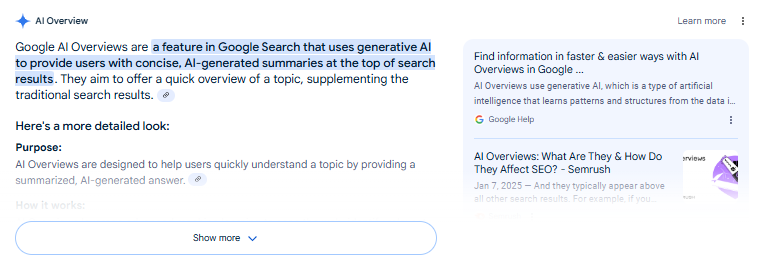The relationship between AI and SEO is changing rapidly—and if you’re in B2B, it’s time to adapt your search strategy. With Google’s new AI Overview feature taking the spotlight on search engine results pages (SERPs), traditional SEO tactics alone may not be enough to keep your content visible or effective.
Here’s what B2B companies need to know about the rise of AI and SEO, and how to stay ahead in this new landscape.
What Is Google’s AI Overview?
Google’s AI Overview is a generative AI feature now appearing at the top of some search results. It offers users a quick, AI-generated summary of the answer to their query—pulling from various online sources to provide a condensed response.
For B2B businesses, this means your hard-earned rankings could be pushed further down the page, and users may find what they need without ever clicking through to your site.

How AI and SEO Are Changing the Game
B2B buyers are already known for doing deep research before making purchasing decisions. Now, AI and SEO are making that process even faster—sometimes bypassing websites entirely.
This shift presents both a challenge and an opportunity. Here’s how B2B businesses can adjust:
5 Ways to Adapt Your B2B SEO Strategy for the AI Era
1. Create Clear, Concise Answers to Key Questions
Generative AI favors and features content that directly answers user questions. Use headings like “What is X?” or “How does Y work?” in your blog posts and service pages to clearly address specific search queries.
Tip: Add FAQ sections at the bottom of each page—Google loves them for structured answers.
2. Focus on Top-of-Funnel Content
With AI summaries giving users quick info, it’s more important than ever to attract prospects earlier in the buyer journey. Educational blogs, industry explainers, and how-to guides are essential.
Example: “What is regulatory compliance in fintech?” or “How to scale your B2B SaaS with automation.”
3. Use Schema Markup and Structured Data
Helping search engines understand your content through structured data increases your chances of being cited in the AI Overview.
Use schema for:
- FAQs
- Product info
- Organization details
- Reviews and case studies
4. Build Authority and Trust
AI-generated content leans on sources it trusts. That means you need:
- Backlinks from reputable sites
- Consistent publishing
- A strong About Us page
- Author bylines with expertise
AI and SEO success depends on demonstrating E-E-A-T (Experience, Expertise, Authority, Trust).
5. Monitor and Update Frequently
AI results are dynamic and depend on fresh content. Regularly update older blog posts, add new stats, and optimize pages for changing search behavior.
The Future of AI and SEO in B2B
As Google’s AI evolves, search will become less about ranking #1 and more about being the most useful, trustworthy source. The connection between AI and SEO means you must start thinking beyond keyword stuffing or backlink chasing—focus instead on creating value-rich content that solves problems for your ideal customers.
B2B buyers are busy. AI is helping them filter noise. Make sure your content is what they’re shown—whether it’s on your site or in the AI-generated summary above it.
Want help future-proofing your SEO strategy? Partner with a marketing agency that understands how AI and SEO are reshaping the B2B landscape.










